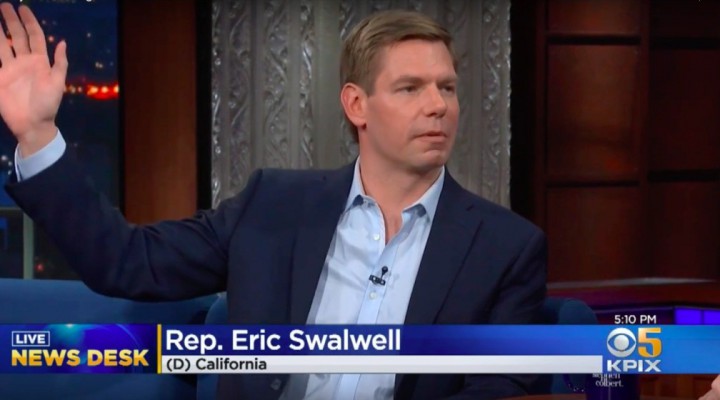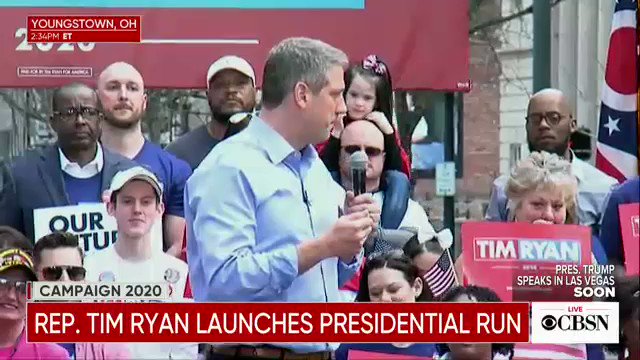“Our enemies come into our social media, and they intentionally try to divide us”: Rep. Tim Ryan warns about Russian interference in national news coverage while launching his 2020 campaign https://cbsn.ws/2uNRCcG
Packed Primary May Let Superdelegates Screw Progressives Again

California Representative Eric Swalwell announced his candidacy for president on The Late Show with Stephen Colbert last night, bringing the total number of Americans demanding that Eric Swalwell run for president to exactly one. It also brings the total number of candidates officially running for the Democratic Party presidential nomination to a whopping 18.
If you don’t remember Swalwell from his controversial tweet last year claiming that the US government could use nuclear weapons on Americans who revolted if their guns were outlawed, you may remember him from his relentless promotion of demented Russiagate conspiracy theories, or from his general foaming-at-the-mouth hawkishness toward Russia. Swalwell has openly admitted that he supports an agenda to “isolate Russia from the rest of the world” using economic warfare, and that he sees the alleged 2016 Russian election interference as “an act of war”.
Swalwell joins another recent addition to the presidential race, Ohio Representative Tim Ryan, as a generic white guy with no redeeming features and nothing distinctive about himself as a politician besides virulent hatred of Russians. Ryan’s official campaign launch speech included a completely gratuitous Red Scare diatribe in which he blamed Russians for the divisiveness which has overtaken political discourse in America.
“We have broken systems in our country that we’ve failed to fix because we’re divided,” Ryan said during his campaign announcement. “And I want you to know that our enemies come into our social media, and they intentionally try to divide us. If there is an incident in America that’s controversial — about kneeling for the National Anthem or there’s a school shooting or there’s an incident between a cop and a kid — you know who comes on to our social media? The Russians. OK? I want you to hear this. The Russians. They come into our social media and they spin things to get us into these divided camps so that we’re fighting with each other. That’s what they want. And meanwhile, we can’t get our economy going. Meanwhile, we can’t get a healthcare system that works.”
Nobody anywhere actually wants either of these people to run for president. From the hemp-wearingest, Phish-listeningest lefty to the pussyhat-wearingest, Maddow-worshippingest centrist in America, nobody wants to see that shit. But it’s happening anyway. For some reason, we’re seeing candidates continually piling onto the Democratic primary race, and piling and piling and piling, even if nobody wants them to.
Why is this? In the last primary there was Hillary, Bernie, and three whatever guys who were only there to make Clinton’s coronation look less like a coronation. Now it’s likely that there will be more than twenty candidates when all the hats are thrown in. What’s going on here?
Well, a big part of it is surely because there are a lot of politicians eager to score political points by taking swings at a despised US president on the national stage. But there is also another factor at play here, and I’d like to lend my voice to the task of drawing more attention to it.
Superdelegates are an elite group of insiders within the Democratic Party whose votes during the primary count way more than those of rank-and-file primary voters, comprising a fifth of total delegates won during the election despite there only being 764 of them. Until the rules were changed last year, candidates have had to vie for both the pledged delegates awarded to them when they win contests in each state, and the unpledged superdelegates who are free to go to whomever they please at the time of the Democratic National Convention. This system was put in place to ensure that Democratic Party insiders would have the ability to keep the riff raff from nominating an unauthorized candidate. As Debbie Wasserman Schultz explained to Jake Tapper back in 2016, “Unpledged delegates exist really to make sure that party leaders and elected officials don’t have to be in a position where they are running against grassroots activists.”
Progressives were elated last August when they were able to push the DNC to make changes to its rules for superdelegates, barring them from voting in the first ballot and only allowing them to come into the process if a candidate fails to secure a clear majority of delegates (meaning more than half of all delegates, not just having more than any other candidate). This was seen as a major victory, because in the last primary superdelegates were used to dishonestly sell the narrative to Democratic voters that Hillary Clinton was the only candidate who could win in the generals by creating the illusion that Clinton had a far greater lead than she actually did, from the very beginning of the primary. Despite being admonished not to by the DNC itself, Clinton-friendly media outlets infuriated progressives by counting in the total delegate count the votes of superdelegates who’d said they planned to vote for Clinton in at the Democratic National Convention, despite their not yet having voted, thus creating the illusion that Clinton was winning the primary by a very wide margin and making Sanders look unelectable.
But it turns out that superdelegates may end up being far more influential during this primary than ever before, because of the large number of primary candidates. A packed primary will make it very difficult for any candidate to secure a clear majority, thus enabling party insiders to come in after the first ballot and crown a candidate whose platform reflects the interests of the Democratic establishment, like Joe Biden, Kamala Harris or Beto O’Rourke.
I’ve been noticing a few Bernie supporters talking about this here and there for a while now, and a number of articles have been written about it, but it hasn’t been something that seems to have gathered a great deal of attention up until this point. The most thorough reporting I’ve been able to find on it so far is a March 29th article by Yahoo News that was originally titled “Loophole could empower Democratic Party insiders at 2020 convention”, but that headline was interestingly changed sometime after publication to the less scandalous-sounding “How Democratic Party insiders could make a comeback at the 2020 convention”. It’s authored by Jon Ward, and I recommend giving it a read if this subject interests you.
Ward writes the following:
But there were not enough votes among the DNC’s membership to completely eliminate superdelegates, and so the compromise agreement reached last August barred them from voting at the convention on the first ballot. That means if the primary process in 2020 produces a consensus candidate who has a majority of delegates heading into the convention in Milwaukee in mid-July, then superdelegates will play no role.
However, if there are two, three or even four Democrats who all win significant victories in the primaries and are all determined to stay in the primary into the convention, then there might not be a nominee after the first vote of the convention delegates. And on the second ballot, the superdelegates’ votes would then be counted, setting off a potentially chaotic sprint to win their support.
It’s very easy to imagine a scenario in which the large number of candidates splits early primaries and sees two, three or four candidates beginning to rack up delegates. Even if Sanders does remain the frontrunner throughout the entire process, a savvy candidate to the political right of him could stay in the race doing just well enough to get to the convention, betting on their ability to woo superdelegates and wind up securing the nomination. One of Kamala Harris’ early hires, which generated buzz among Democratic Party insiders, was Clinton campaign superstar “Delegate Dave” Huynh, so nicknamed for his tight relationship with superdelegates and knack for winning them over.
Elaine Kamarck, a DNC member who Ward describes as “one of the party’s foremost rules experts,” told Yahoo News that she does think we could see superdelegates picking the 2020 nominee, but that she believes voters will welcome it.
“There’s a source of legitimacy to say, look, the voters didn’t decide. And if the voters didn’t decide, you can’t rerun 50 elections,” Kamarck said. “The natural people to decide are the leadership of the party, and that would be the superdelegates. I think there’s a legitimacy that people would be willing to accord it.”
“It’s not like we did this in secret. It’s been established since last year,” Kamarck added. “People will complain and then it will be pointed out to them that this was always the case.”
Obviously if Sanders comes up short of 51 percent of delegates at the convention but is still in the lead, nominating anyone other than him would be seen by many as an unforgivable betrayal and a desecration of small-‘d’ democratic values. In my opinion, should the first ballot fail to establish a clear winner, the extent to which superdelegates will be willing to outrage the party’s progressive base will depend on two related factors: how badly they want to beat Trump, and how badly they want to avoid a President Bernie Sanders. Last time they were willing to risk getting Trump elected in order to keep Sanders out, and that may still be the case; the plutocrats who own the Democratic Party certainly aren’t doing any worse under Trump.
But of course if they do end up going that route, Trump will be the excuse that they use. All that matters is defeating the Orange Menace. Stop yelling and fall in line behind Uncle Joe/Auntie Kamala/Weird Stepbrother Beto. Do you want another four years of Trump? Then shut up and fall in line.
And who knows? It just might work.
US elections are so damn stupid. They don’t let people nominate real human beings for either of the two mainstream parties, then if you try to vote for a third party they scream “No you can’t do that either!” and spend the next four years shrieking about Susan Sarandon. It doesn’t even pretend to be anything like actual representative democracy. I’ve been trying to ignore the Democratic primaries because the whole thing’s a farce and no real steps were taken to fix the staggering problems exposed in the last one, but it’s also a major project for the establishment narrative control operatives, so they’ll be exposing themselves a lot in the process. It remains to be seen how severely.
 TheAltWorld
TheAltWorld 





0 thoughts on “Packed Primary May Let Superdelegates Screw Progressives Again”